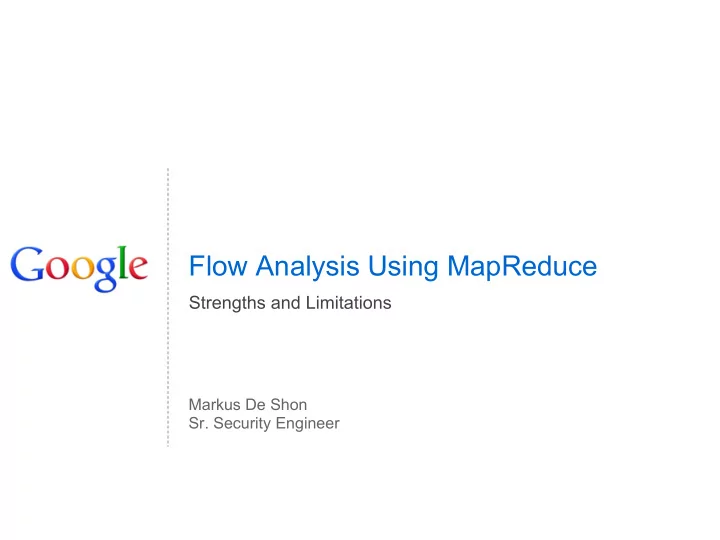

Flow Analysis Using MapReduce Strengths and Limitations Markus De Shon Sr. Security Engineer
Agenda MapReduce What is it? Case Study Entropy Timeseries Scaling MapReduces Other thoughts, Conclusions
MapReduce: What is it? A parallel computational method 3 stages ● Map: Apply function(s) to each record, compute a sharding key ● Shuffle: Group data by sharding key ● Reduce: Apply function(s) to records for each key Optimal for trivially parallelizable problems Our problems sometimes are, sometimes not... ●
Shuffle phase This is where the magic happens... Transport Locally: localhost sockets ● Different host: RPC of protocol buffer over TCP socket ● There is no free lunch (e.g. count distinct) How is data distributed among input shards? ● Ideally, key by input shard (e.g. input filename), but any non-trivial ● shuffle will defeat this Try to optimize (number of keys * number of emits per key) ●
Case study: Entropy timeseries Normalized Shannon Entropy: p i = probability of each bin (count in bin i/N) N = total count Single pass version (after binning): "logsum" L, "sum" S, "entropy" E c i = count in each bin
Case study: Entropy: High-level design Map Only calculate partial sums ● Shuffle Deliver data for each key to the shard handling that key ● Reduce Calculate the final sums (L and S) ● Calculate the entropy ●
Case study: Entropy: Details Map Calculate the key (e.g. [source ASN, time bin]) ● For each key, emit e.g. { source IP, packet count } tuples ● Shuffle Reorganize data by the [source ASN, time bin] key ● A particular shard receives all the tuples for a particular [source ● ASN, time bin] key Reduce Iterate through the data calculating a map[source IP] of packet ● counts Finally, iterate through the map and perform the one-pass entropy ● calculation
Case study: Entropy: Optimization Typically, you would be generating multiple such entropy time series source IP, dest IP, source port, dest port ● perhaps multiple weightings by packet count ● by byte count ● Optmize by emitting once for each chunk of input records data type = enum { sIP, dIP, sPort, dPort } ● e.g. per [ASN, time bin] key do a single emit for a list of all your { ● data type, packet count, byte count } tuples Advantage: Fewer RPCs ○ Danger: RPC too large ○
Scaling MapReduces Map How many unique input sources? ● Log files processed simultaneously ○ HBase rows ○ How is data distributed by sharding key? ● More grouping is better ○ Reduce How many unique sharding keys? ● More than that many shards is pointless ○ Memory/CPU allocation per shard ●
"Real time" flow analysis Frequent, small MapReduces over recently arrived data Time windowing vs. latency are critical considerations (cursors) Need good bookmarking of input files
Other thoughts: SiLK http://tools.netsa.cert.org/silk Can SiLK-like analyses be done using MapReduce? Sort of... rwfilter Yes! Just matching, boolean forward or not on per-record basis ● Hard: doing ipsets, tuples efficiently per shard ● rwsort Done automatically by sharding key, subkeys (depending on ● output method) rwcount, rwuniq, rwbag Yes, but need to optimize for scalability ● rwstats Yes, rwuniq plus sorting by value ● rwset Yes, sort of. Not easy, not optimized to IPv4 ● rwsettool: not really, not as elegantly ● Quick, iterative analysis: Not really, unless... (cf. SQL/MR)
Conclusions Strengths Commodity computing platform ● Strong scalability for many problems of interest to us ● Good for ongoing, repeated analyses of large amounts of data ● "Real time" analyses feasible (not as much of a commodity) ● Limitations Inherent overhead in shuffling phase ● Irreducible anyway? Remember: no free lunch ○ Not so good for iterative, ad hoc analysis (except SQL/MR) ●
Recommend
More recommend